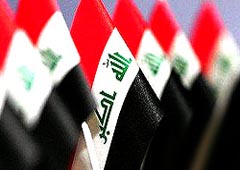Iraqi Foreign Minister Hoshyar Zebari underlined that his country is determined to expel the  terrorist Mojahedin-e Khalq Organization (MKO also known as the MEK, PMOI and NCR), and asked the world states to help Baghdad with the rapid expulsion of the terrorist cult.
terrorist Mojahedin-e Khalq Organization (MKO also known as the MEK, PMOI and NCR), and asked the world states to help Baghdad with the rapid expulsion of the terrorist cult.
"Iraq has fulfilled its international undertaking with regard to the transfer of these elements to Liberty Base and it is now the turn of the European, North American, and generally foreign states, to accept resettling the residents of Ashraf Camp in their countries because their stay in Liberty Camp is temporary and transitional," Zebari said during a meeting with Beat Schweizer, Head of the International Committee of the Red Cross (ICRC) in Iraq, a statement by Iraq’s Foreign Ministry said on Monday.
The MKO is seeking to transfer its members to another country, but no world state, including the US and the European countries, has accepted to lodge the terrorist group.
To date, almost 1200 MKO terrorists have been transferred from Camp Ashraf to Camp Liberty which lies Northeast of the Baghdad International Airport, in three groups of 400 each, on February 18, 8, and March 20. About 2,000 members still remain in Camp Ashraf. Camp Liberty is a transient settlement facility and a last station for the MKO in Iraq.
The MKO cannot find a shelter outside Iraq as it is blacklisted by much of the international community, including the United States.
Before an overture by the EU, the MKO was on the European Union’s list of terrorist organizations subject to an EU-wide assets freeze. Yet, the MKO puppet leader, Maryam Rajavi, who has residency in France, regularly visited Brussels and despite the ban enjoyed full freedom in Europe.
The MKO is behind a slew of assassinations and bombings inside Iran, a number of EU parliamentarians said in a recent letter in which they slammed a British court decision to remove the MKO from the British terror list. The EU officials also added that the group has no public support within Iran because of their role in helping Saddam Hussein in the Iraqi imposed war on Iran (1980-1988).
Many of the MKO members abandoned the terrorist organization while most of those still remaining in the camp are said to be willing to quit but are under pressure and torture not to do so.
A May 2005 Human Rights Watch report accused the MKO of running prison camps in Iraq and committing human rights violations.
According to the Human Rights Watch report, the outlawed group puts defectors under torture and jail terms.
The group started assassination of the citizens and officials after the revolution in a bid to take control of the newly established Islamic Republic. It killed several of Iran’s new leaders in the early years after the revolution, including the then President, Mohammad Ali Rajayee, Prime Minister, Mohammad Javad Bahonar and the Judiciary Chief, Mohammad Hossein Beheshti who were killed in bomb attacks by MKO members in 1981.
The group fled to Iraq in 1986, where it was protected by Saddam Hussein and where it helped the Iraqi dictator suppress Shiite and Kurd uprisings in the country.
The terrorist group joined Saddam’s army during the Iraqi imposed war on Iran (1980-1988) and helped Saddam and killed thousands of Iranian civilians and soldiers during the US-backed Iraqi imposed war on Iran.
Since the 2003 US invasion of Iraq, the group, which now adheres to a pro-free-market philosophy, has been strongly backed by neo-conservatives in the United States, who also argue for the MKO to be taken off the US terror list.
The MKO was in Iraq’s Diyala province for nearly three decades before it was moved to Camp Liberty.

